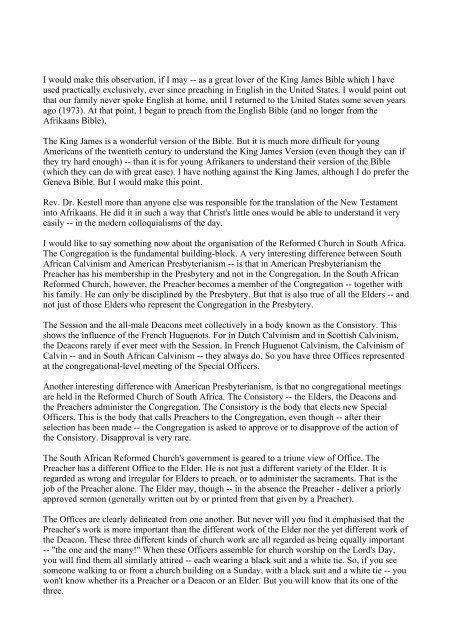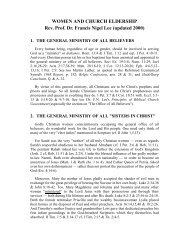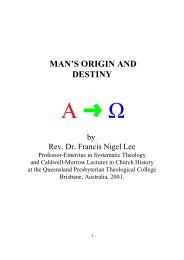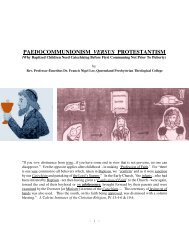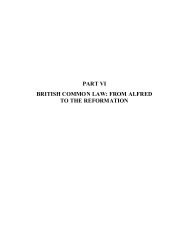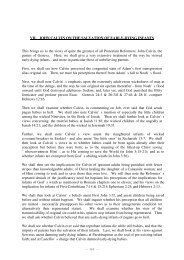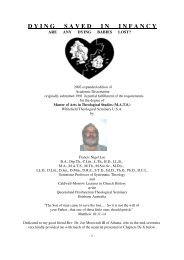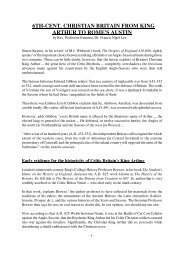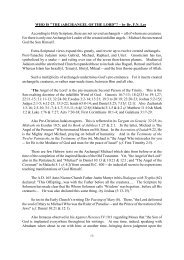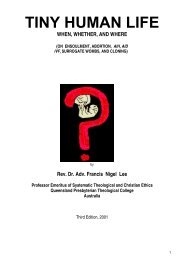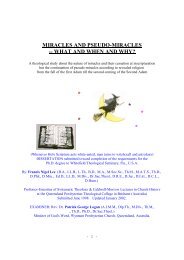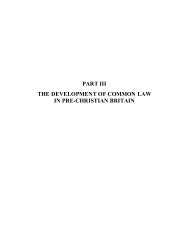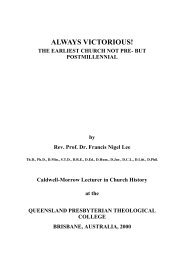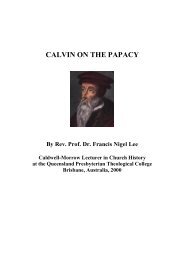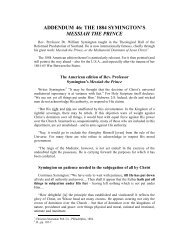THE CHRISTIAN AFRIKANERS - The Works of F. N. Lee
THE CHRISTIAN AFRIKANERS - The Works of F. N. Lee
THE CHRISTIAN AFRIKANERS - The Works of F. N. Lee
Create successful ePaper yourself
Turn your PDF publications into a flip-book with our unique Google optimized e-Paper software.
I would make this observation, if I may -- as a great lover <strong>of</strong> the King James Bible which I haveused practically exclusively, ever since preaching in English in the United States. I would point outthat our family never spoke English at home, until I returned to the United States some seven yearsago (1973). At that point, I began to preach from the English Bible (and no longer from theAfrikaans Bible).<strong>The</strong> King James is a wonderful version <strong>of</strong> the Bible. But it is much more difficult for youngAmericans <strong>of</strong> the twentieth century to understand the King James Version (even though they can ifthey try hard enough) -- than it is for young Afrikaners to understand their version <strong>of</strong> the Bible(which they can do with great ease). I have nothing against the King James, although I do prefer theGeneva Bible. But I would make this point.Rev. Dr. Kestell more than anyone else was responsible for the translation <strong>of</strong> the New Testamentinto Afrikaans. He did it in such a way that Christ's little ones would be able to understand it veryeasily -- in the modern colloquialisms <strong>of</strong> the day.I would like to say something now about the organisation <strong>of</strong> the Reformed Church in South Africa.<strong>The</strong> Congregation is the fundamental building-block. A very interesting difference between SouthAfrican Calvinism and American Presbyterianism -- is that in American Presbyterianism thePreacher has his membership in the Presbytery and not in the Congregation. In the South AfricanReformed Church, however, the Preacher becomes a member <strong>of</strong> the Congregation -- together withhis family. He can only be disciplined by the Presbytery. But that is also true <strong>of</strong> all the Elders -- andnot just <strong>of</strong> those Elders who represent the Congregation in the Presbytery.<strong>The</strong> Session and the all-male Deacons meet collectively in a body known as the Consistory. Thisshows the influence <strong>of</strong> the French Huguenots. For in Dutch Calvinism and in Scottish Calvinism,the Deacons rarely if ever meet with the Session. In French Huguenot Calvinism, the Calvinism <strong>of</strong>Calvin -- and in South African Calvinism -- they always do. So you have three Offices representedat the congregational-level meeting <strong>of</strong> the Special Officers.Another interesting difference with American Presbyterianism, is that no congregational meetingsare held in the Reformed Church <strong>of</strong> South Africa. <strong>The</strong> Consistory -- the Elders, the Deacons andthe Preachers administer the Congregation. <strong>The</strong> Consistory is the body that elects new SpecialOfficers. This is the body that calls Preachers to the Congregation, even though -- after theirselection has been made -- the Congregation is asked to approve or to disapprove <strong>of</strong> the action <strong>of</strong>the Consistory. Disapproval is very rare.<strong>The</strong> South African Reformed Church's government is geared to a triune view <strong>of</strong> Office. <strong>The</strong>Preacher has a different Office to the Elder. He is not just a different variety <strong>of</strong> the Elder. It isregarded as wrong and irregular for Elders to preach, or to administer the sacraments. That is thejob <strong>of</strong> the Preacher alone. <strong>The</strong> Elder may, though -- in the absence the Preacher - deliver a priorlyapproved sermon (generally written out by or printed from that given by a Preacher).<strong>The</strong> Offices are clearly delineated from one another. But never will you find it emphasised that thePreacher's work is more important than the different work <strong>of</strong> the Elder nor the yet different work <strong>of</strong>the Deacon. <strong>The</strong>se three different kinds <strong>of</strong> church work are all regarded as being equally important-- "the one and the many!" When these Officers assemble for church worship on the Lord's Day,you will find them all similarly attired -- each wearing a black suit and a white tie. So, if you seesomeone walking to or from a church building on a Sunday, with a black suit and a white tie -- youwon't know whether its a Preacher or a Deacon or an Elder. But you will know that its one <strong>of</strong> thethree.


